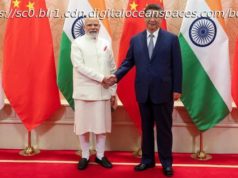In the Chinese capital it’s business as usual, for now
On a quiet street in the embassy district of Beijing, a neon-lit national flag forms an impressive backdrop to an almost empty North Korean restaurant as young waitresses sent from Pyongyang stand around waiting for customers.
“Business has been going down for a while,” one of them said as she flipped through a menu featuring North Korean seafood and Australian beef. “It’s not doing well.”
Their future is uncertain – the restaurant is one of many that will be forced to close after the Chinese government ordered all North Korean businesses to shut down within 120 days from September 11. That was the date the United Nations Security Council imposed a tough new round of sanctions against Pyongyang over its repeated ballistic missile and nuclear tests.
All North Korean firms and joint ventures in China to be closed
There are an estimated 50,000 to 60,000 North Koreans working in about 50 countries, most of them in China and Russia, earning the regime some US$500 million a year, according to South Korea’s intelligence agency and the United States.
But many of those working in China may have to return home soon because – in line with the latest UN sanctions – Chinese companies cannot hire new North Korean workers or renew existing contracts.
A source close to the business community in Dandong, the main Chinese gateway to North Korea, said companies were told in mid-September not to hire new North Korean workers.
Some of these workers are employed in the mining sector, but many of them work in the service industry, particularly in restaurants.
It was unclear how long North Koreans already on contracts could remain in China, the source said, but “the authorities are serious about implementing these sanctions”.
As UN sanctions bite, North Korean workers leave Chinese border hub
In the restaurant in Beijing, the waitress, in her 20s, would not discuss her future in the city but explained how she had ended up there.
“We came here on a three-year contract – we’re all from Pyongyang. There’s no one from any other part of the country,” she said.
“We don’t have a choice – our jobs are assigned by the government. I studied hospitality management at university and I was sent to Beijing. I didn’t know any Chinese when I arrived,” she said, describing a situation that would be considered forced labour under international laws.
The source in Dandong said workers sent from Pyongyang were carefully vetted to make sure they were “politically reliable”, and some were the children of senior North Korean officials.
“For example, one condition is that they should have family members still living inside North Korea,” the source said, suggesting the authorities would hold workers’ relatives accountable if they defected.
China has been under mounting international pressure to stop funding the North Korean regime, especially since US President Donald Trump came to power.
North Korea’s annual investment in China is tiny – it fell from US$11.2 million in 2010 to just US$70,000 in 2015, according to figures released last year by the Korea International Trade Association in Seoul.
How North Korea keeps its economy humming despite the sanctions
One diplomat in the city expected some North Korean businesses would find a way to remain operating after the deadline passed.
“The 120-day period gives these enterprises enough time to restructure so that they can continue operating in China in another form,” the diplomat said. “If they’re no longer owned by North Korean investors – by transferring ownership of the business to Chinese nationals – they need not be closed down.”
But Lu Chao, director of the Border Study Institute at the Liaoning Academy of Social Sciences, said most North Korean companies in China, particularly the restaurants, will close “given the seriousness of a Ministry of Commerce order”. “I expect all the workers will be asked to leave,” Lu said.
Back at the restaurant in Beijing, however, the imminent threat of closure did not appear to be bothering the staff. Nearing closing time, a cheerful manager – with badges of late North Korean leaders Kim Il-sung and Kim Jong-il pinned to her shirt – emerges from a back room to check the day’s takings with the cashiers and joke with the waitresses. Her restaurant, and two other North Korean restaurants in Beijing visited by the South China Morning Post this week, showed no sign of closing their doors – and it was unclear when they would finally flick the switch on that neon-lit flag.
Additional reporting by Associated Press






